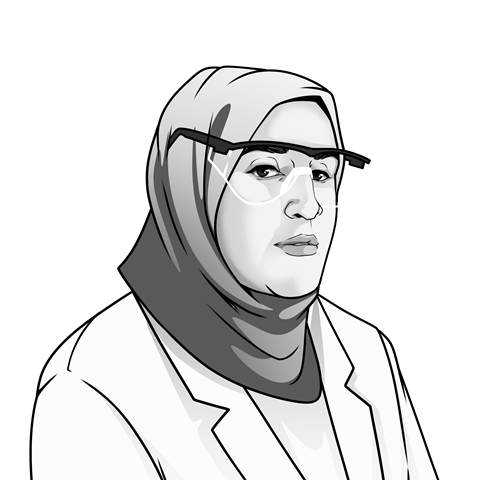Applied Microbiology International has just appointed 14 junior editors to its flagship journal Letters in Applied Microbiology (LAM) - selected from more than 100 applicants by the Editor-in-Chief, Dr Marcela Hernández.
Letters in Applied Microbiology has a focus on early career researchers to support and develop the next generation of applied microbiologists.

The junior editors, early careers researchers within six years of completing a PhD, will be working with senior editors as mentors for two years to learn how to handle papers through all stages of the peer review process, while upholding high ethical standards and striving to give all authors the best experience in their interactions with the journal.
We found out a bit more about some of the new intake of junior editors - and what fascinates them about microbiology.
Sanjana Mukherjee is is a microbiologist with experience in infectious disease epidemiology, global health security and public health policy. She is currently working at Georgetown University with a focus on addressing HIV/AIDS and other pandemic threats.

What first sparked your love of microbiology?
I’ve wanted to be a microbiologist ever since I read a chapter in my high-school biology textbook on how microbes affect almost every aspect of our world - from cheese-making to helping digest our food to causing serious diseases in humans.
What’s the microbe that most fascinates you and why?
Though I’ve never worked on this microbe, Deinococcus radiodurans fascinates me the most - it’s listed in the The Guinness World Records as the most radiation resistant life form!
What real-world problem would you eventually love to solve with microbiology?
I’m interested in helping countries prevent, prepare and respond to infectious disease threats and prevent them from becoming pandemics. I would love to engage with different countries and international organizations to tackle transboundary threats such as antimicrobial resistance, neglected diseases, HIV/AIDS and other microbes with pandemic potential.
What has drawn you to publishing and what would you like to achieve?
By helping in the dissemination of scientific research and ideas through publishing, I hope to facilitate conversations between scientists, policymakers and the public on how we can use microbiology research to help tackle the world’s most pressing needs - whether it’s discovering the next antibiotic or figuring out what genes make a microbe dangerous
Thomas Thompson of the School of Pharmacy, Queen’s University Belfast, UK, is a pharmacist and a dedicated researcher in applied microbiology with over ten years of experience in academia and industry.

What first sparked your love of microbiology?
When I was an undergraduate, I did a summer studentship with Professor Brendan Gilmore. We were exploring marine algae as a source of novel antibiotics! The rigorous pursuit of knowledge and the thrill of discovery ignited my love for microbiology.
What’s the microbe that most fascinates you and why?
It has to be the archaea, without a doubt. These resilient, ancient organisms were the focus of my PhD. Their ability to thrive in extreme environments makes them incredibly fascinating to study. An honourable mention must go to Chromobacterium violaceum for its beautiful colour!
What real-world problem would you eventually love to solve with microbiology?
While their potential to tackle antibiotic resistance cannot be understated, I envision microbiology contributing to a range of challenges. From solving the plastic waste problem to enhancing food production, the potential of the microbial world is huge!
What has drawn you to publishing and what would you like to achieve?
I have always had a passion for publishing and storytelling. I hope to encourage more early-career researchers to share their stories and showcase the marvels of applied microbiology.
Racheal Oluwayemisi Fashogbon is a lecturer and researcher in the Department of Biological Sciences at Ajayi Crowther University Oyo, Nigeria.

What first sparked your love of microbiology?
I chose microbiology because it seemed to fit what I was passionate about and interested in. I fell in love with the hands-on process of answering questions by carrying out experiments and seeing results. I fell in love with working in the microbiology laboratory to isolate and identify unknown species.
What’s the microbe that most fascinates you and why?
The most fascinating microbe to me is lactic acid bacteria (LAB). My passion for lactic acid bacteria grew due to its probiotic potential and health-promoting benefits associated with the consumption of fermented foods.
What real-world problem would you eventually love to solve with microbiology?
I intend to reduce food problems through the improvement of current food production, safety and preservation. Microbiology has a direct link to achieving Sustainable Development Goals (SDGs) addressing food security/zero hunger (SDG 2), health and well-being (SDG 3) and responsible consumption and production (SDG 12).
What has drawn you to publishing and what would you like to achieve?
Publishing is a broad atmosphere that helps in disseminating scholarly findings or results of experiments to inform the audience about new concepts and gaps yet to be explored/filled in research. I intend to publish scholarly articles that will help to enlighten researchers/consumers on discoveries, disseminate findings, thereby serving as a means of getting the current update on issues happening around the globe about food/industrial microbiology.
Van Hung Vuong Le is a postdoc researcher at the Section of Microbiology, University of Copenhagen, Denmark, working on conjugative plasmid diversity and the interaction between plasmids and bacteriophage.

What first sparked your love of microbiology?
My BSc degree covered biotechnology in animals, plants and microbes. My disinterest in animal and plant systems drove my decision to major in microbial biotechnology, that indeed kicked off an exciting research journey.
What’s the microbe that most fascinates you and why?
Pseudomonas aeruginosa. This is a formidable pathogen and I would like to kill it every time with different ways.
What real-world problem would you eventually love to solve with microbiology?
Antimicrobial resistance.
What has drawn you to publishing and what would you like to achieve?
Curiosity and willing to learn the editing practice. I would like to facilitate a fair and rapid peer-reviewing process for science discovery sharing.
Elizabeth A McMillan is a postdoctoral microbiologist with the USDA Agricultural Research Service at the U.S. National Poultry Research Center in the Poultry Microbiological Safety and Processing Research unit.

What first sparked your love of microbiology?
I had a wonderful 9th grade Biology teacher who also taught a Microbiology elective for higher grade levels. I took the class because he was a great teacher and I ended up with a lifelong passion for microbiology research.
What’s the microbe that most fascinates you and why?
My PhD thesis was all about Salmonella and it continues to fascinate me. We know so much about it genotypically and phenotypically and yet we are still learning new things about it, plus it can carry many plasmids which allows for endless variation!
What real-world problem would you eventually love to solve with microbiology?
I would love to be able to eliminate human salmonellosis.
What has drawn you to publishing and what would you like to achieve?
I think publishing is the most important step in the scientific process because that’s how our results actually make an impact. As a junior editor, I hope to learn more about the process so that I can write better papers, become a better reviewer, and serve the scientific community by helping others learn more about publishing so that they can do the same.
Terry Bilverstone is a Research Fellow at the Synthetic Biology Research Centre (SBRC), University of Nottingham, who applies genetic tools to study the function and genetic regulation of toxins in the pathogenic clostridia, to direct the development of precision therapeutics theretoward.

What first sparked your love of microbiology?
When I realised that civilisations had been applying microbial biotechnology unwittingly, in the fermentation of foods and beverages for millennia. I enjoyed learning about the development of microscopes and how pioneering microbiologists eventually discovered the driving forces behind these processes.
What’s the microbe that most fascinates you and why?
The microbe that fascinates me most is the one which I have devoted the majority of my research time towards - Clostridioides difficile, the leading cause of nosocomial diarrhoea. This spore-forming anaerobe presents a considerable challenge to healthcare systems, since the very antibiotics prescribed to treat this infection also represent the predisposing risk factor for its contraction - thus highlighting the need for more effective therapies.
What real-world problem would you eventually love to solve with microbiology?
I would love to contribute towards more effective therapies for the treatment of C. difficile infection. I am currently pursuing the development of small-molecule inhibitors and bacteriophages as alternative antimicrobial agents.
What has drawn you to publishing and what would you like to achieve?
I have always wanted to get involved in scientific publishing, but many positions are reserved for tenured academics. The call for Junior Editors for Letters in Applied Microbiology was an opportunity not to be missed, which I think aptly reflects the journal’s new emphasis for developing the next generation of applied microbiologists.
Delveen Ibrahim is a lecturer in the Department of Biology, College of Science, at the University of Duhok, Iraq. Her research focuses on understanding how ancient and novel antimicrobial treatments kill bacteria, as well as how bacteria become resistant to them.

What first sparked your love of microbiology?
The Microbe and Human health interaction was what sparked my interest in microbiology. Bacteria continuously mutate their DNA, becoming resistant to antibiotics and attacking the hosts’ immune system.
What’s the microbe that most fascinates you and why?
Escherichia coli is the bacteria that fascinates me because it is a versatile microbe and can adapt to the host environment.
What real-world problem would you eventually love to solve with microbiology?
The problem of antimicrobial resistance is a major thing that I hope that I can solve during my research.
What has drawn you to publishing and what would you like to achieve?
We must publish our research results so others can continue the work that we start and build on it for the community benefit. In the future I hope to publish more research articles which are related to the One Health issue.
Silvani Verruck is is a Professor of Food Microbiology and Functional Foods at the Department of Food Science and Technology at the Federal University of Santa Catarina, Brazil. Her major research focus is on food science and technology, with an emphasis on food microbiology and technology of animal-origin products.

What first sparked your love of microbiology?
I developed a passion for food microbiology during my undergraduate studies when I discovered the intricate world of microorganisms and their role in various biological processes. After graduation my love for microbiology was sparked by the fascinating world of lactic acid bacteria.
What’s the microbe that most fascinates you and why?
Bifidobacteria and lactic acid bacteria, with their diverse strains and applications in food fermentation and probiotics, captivate my interest the most due to their essential role in our daily lives and their potential for improving human health.
What real-world problem would you eventually love to solve with microbiology?
I aspire to utilize probiotics to address gut health and digestive disorders, offering solutions that can enhance the well-being of individuals suffering from these conditions. Additionally, I am committed to employing my research to address antibiotic resistance within the food chain and formulate effective strategies to address this urgent public health concern.
What has drawn you to publishing and what would you like to achieve?
I am drawn to publishing as a means to share knowledge and contribute to the scientific community. My goal is to disseminate research that can help advance our understanding of food microbiology and improve human health.
Topics
- Applied Microbiology International
- Be inspired
- Brendan Gilmore
- Chromobacterium violaceum
- Clostridioides difficile
- Community
- Deinococcus radiodurans
- Delveen Ibrahim
- Early Career Research
- Elizabeth A McMillan
- Escherichia coli
- lactic acid bacteria
- Letters in Applied MIcrobiology
- Marcela Hernández
- Pseudomonas aeruginosa
- Publishing
- Racheal Oluwayemisi Fashogbon
- Salmonella
- Sanjana Mukherjee
- Silvani Verruck
- Terry Bilverstone
- Thomas Thompson
- Van Hung Vuong Le







No comments yet